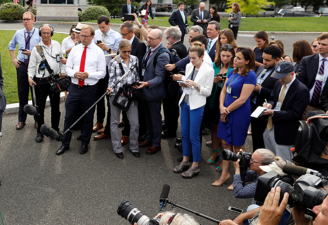The public is experiencing "information fatigue" in its information intake. "Sensitive" information has become less sensitive today, suggesting that the media can provide society with more so-called "sensitive" information. This suggests that "information fatigue" can be exploited. Timely media reporting not only expedites problem resolution and protects the vital interests of some segments of the public, but also maintains information transparency and safeguards the public's right to know. Finally, from the perspective of national governance, it is proposed that relaxing communication controls can promote "good governance" in social management.
The public is experiencing "information fatigue" in its information intake. "Sensitive" information has become less sensitive today, suggesting that the media can provide society with more so-called "sensitive" information. This suggests that "information fatigue" can be exploited. Timely media reporting not only expedites problem resolution and protects the vital interests of some segments of the public, but also maintains information transparency and safeguards the public's right to know. Finally, from the perspective of national governance, it is proposed that relaxing communication controls can promote "good governance" in social management.
Background
Against the backdrop of rapid developments in network technology, the instantaneous emergence of massive amounts of information, and the increasing diversity of social life, the public often experiences "information fatigue" in its information intake. "Information fatigue" refers to the fact that, in the current environment where the amount of information is increasing exponentially and information sources are constantly expanding, individual choices are becoming increasingly diverse, and the amount of information received can only be maintained at a certain level, the public often has no time to pay attention to much information. This is especially true for information that has been previously reported. Even information that is traditionally "sensitive" is rarely closely followed by the majority of the public, except for those with vital interests. The phrase "not paying close attention" here primarily refers to two situations: not paying attention and simply understanding. "Not paying attention" means being unaware of the relevant information; "simple understanding" means being aware of the relevant information but paying little attention to its specific causes, developments, and final outcomes. This suggests that information fatigue can be exploited, as "sensitivity" can be reduced to insensitivity, allowing for the provision of more so-called "sensitive" information to society. This is analogous to the famous phrase "I'm just hanging out there" circulated during the nude photo scandal, which conveyed a public attitude of indifference and disdain for response. Amidst the information frenzy, the public is slowly learning to adjust and return to their daily lives, choosing only to pay attention to news reports relevant to their interests. The public's attention and acceptance of various information has entered a period of indifference, numbness, and even fatigue. New concepts no longer easily evoke emotions, and new ideas and creativity no longer generate widespread excitement.

In an age of information overload, how can one maintain calm and focus?
- Clear goals and clear positioning
Secondly, identify the right goals and maintain a clear positioning. Don't be overwhelmed by information overload. Filter out irrelevant information and focus only on what's helpful and goal-oriented. This way, you won't get lost.
- Absorb good advice and stay open.
Furthermore, absorb good advice and suggestions, including those related to work. Don't shut yourself off from information and be able to solve problems promptly.
- Self-control: Focus on the present moment.
Finally, develop self-control. Do what's right for you at each stage. Don't rush into things; focus on what you're doing.
- Manage your social circle.
Finally, manage your personal and professional circles well, maintain good health, and eliminate habits that harm your health.




